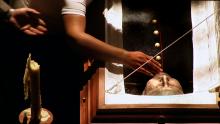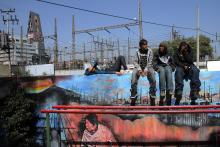SPANISH FILM FESTIVAL
Hosted by Amherst College

WHERE: Stirn Auditorium
Parking Info
Sponsored by the Georges Lurcy Lecture Series Fund at Amherst College, with additional support from the Amherst College Spanish, European Studies and Film & Media Studies Departments.
WEDNESDAY MARCH 27, 2013
CHICO Y RITA [ Chico and Rita ]
Fernando Trueba, Javier Mariscal & Tono Errando / 94 min. / 2012
7:00 p.m.
Introduced by Lucia Suarez, Associate Professor of Spanish, Amherst College

WEDNESDAY APRIL 3, 2013
AMERIKANUAK
Nacho Reig / 92 min. / 2011
7:00 p.m.
Introduced by Justin Crumbaugh, Associate Professor of Spanish, Latin/o, and Latin American Studies, Mount Holyoke College

More than half a century ago, many Basques left Spain to look for a better life working as sheepherders in the American West. In Amerikanuak, Nacho Reig looks at the lives of some of the last remaining Basque sheepherders in the United States. The documentary takes place under the vast blue skies and bleak but beautiful winter landscape of the small town of Elko, Nevada. Through the reflections of immigrants such as Juan Juaristi “Parrillas,” an 83-year old boarder at the Basque boardinghouse, the Star Hotel of Elko, we hear about the difficulties that many of these immigrants faced in forging new lives in a foreign country, as well as their nostalgia for what was left behind. The Basque group Audience created the soundtrack specifically for the film and the sounds of traditional American folk music resonate throughout the tracks, providing the perfect background for this film about overcoming hardship, adaptation, courage, community and a way of life that will soon be gone forever.
WEDNESDAY APRIL 10, 2013
LA MUERTE DE PINOCHET [The Death of Pinochet]
Ivan Osnovikoff & Bettina Perut / 67 min. / 2011
7:00 p.m.
Introduced by Victoria Maillo, Lecturer of Spanish, Amherst College

On December 10, 2006, General Pinochet died in Santiago’s Military Hospital. For 24 hours, his death reawakened the political divisions that marked Chile’s recent history with dictatorship, death and violence. In The Death of Pinochet, Bettina Perut and Ivan Osnovikoff use original footage and the testimonies of four characters who lived through that day, to relate the end of a key chapter in Chile’s history. A work that balances tragedy and comedy, it is a surprising portrait of Chilean society. In observing and giving voice to a group of Chilean people on a very special day in that country’s history, Perut and Osnovikoff show the same provocative spirit that they demonstrated in their previous film Noticias (News). By the time of his death, Pinochet had not held power in Chile for several years. However, this fascinating documentary shows that although Pinochet may now be gone, he has certainly not been forgotten.
WEDNESDAY APRIL 17, 2013
ASALTO AL CINE [The Cinema Hold Up]
Irina Gómez Concheiro / 124 min. / 2011
7:00 p.m.
Introduced by Ilan Stavans, Lewis-Sebring Professor in Latin American and Latino Culture, Amherst College

The Cinema Hold Up is a vibrant, authentic, and wonderfully observed portrait of the tempo and texture of today's Mexican youth culture. First-time feature director Iria Gómez Concheiro draws pitch-perfect performances from the talented ensemble cast and registers a strong and original voice in Mexican cinema. Negus, Chale, Sapo and Chata are teenagers who grew up in the same rundown district of Mexico City. They spend their days listening to hip-hop, smoking marihuana and fantasizing about the opposite sex. One day they have the bright idea of robbing a movie theater, jeopardizing the one sure thing they have in life – their friendship. An explosive, entertaining comedy with impeccable performances, this original, unpredictable debut establishes Iria Gómez Concheiro as a promising new voice in Mexican cinema.
WEDNESDAY APRIL 24, 2013
TAMBIEN LA LLUVIA [Even the Rain]
Icíar Bollaín / 104 min. / 2011
7:00 p.m.
Introduced by Tara Daly, Visiting Assistant Professor of Spanish, Latina/o Studies and Latin American Studies, Mount Holyoke College

Filmmaker Sebastian (Gael García Bernal) and his cynical producer Costa (Luis Tosar) arrive in Cochabamba, Bolivia to make a film about Columbus’s voyage to the New World and the subjugation of the indigenous population. Just as filming begins, the natives face a crisis when the government privatizes the water company and prices skyrocket. Daily protests erupt and the local man cast as a rebellious sixteenth century Taino chief, also becomes a leader in the water hike protests. Bollaín intercuts footage of Sebastian’s film, with recordings of the demonstrations that occurred during the real life “Water Wars” that took place when the Bolivian government privatized the water company in 2000. In this masterful film-within-a-film which is anchored in the philosophies of historian Howard Zinn, as well as the stories of 16th century priests, Fathers Bartolome de las Casas and Antonio Montesinos, Bollaín raises questions about exploitation in South America, blurring the lines between past and present, fiction and reality.
The Spanish Film Club series was made possible with the support of Pragda, the
Secretary of State for Culture of Spain, and its Program for Cultural Cooperation with
United States' Universities.
